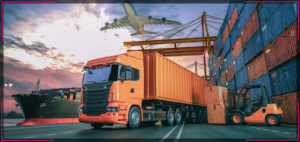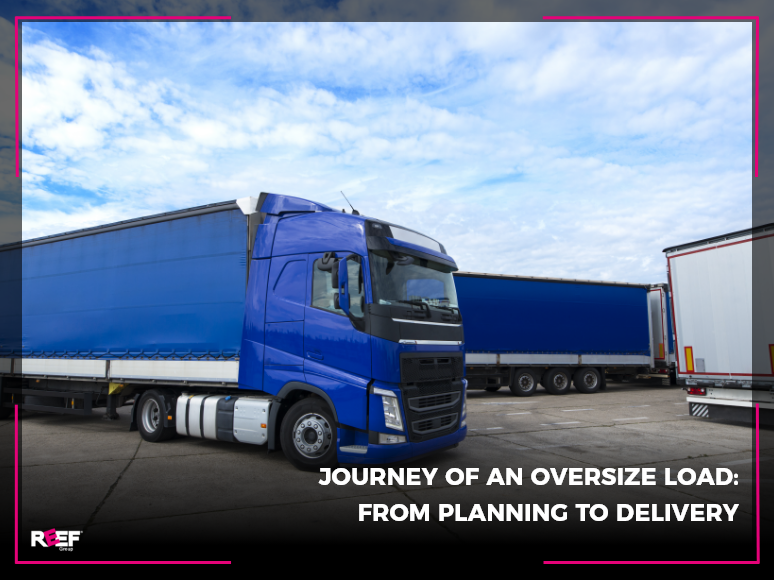Risk Management in Logistics: How Transport Services Minimise Business Risks

Effective Load Balancing Techniques for Oversize Transport
January 5, 2024
Journey of an Oversize Load: From Planning to Delivery
March 5, 2024
Risk management applies to all businesses in one form or another and the transport and logistics industry has its own set of challenges. If something goes wrong and there’s a disruption to the supply chain, it can be a major issue for everyone concerned.
Transport services need to be dedicated to mitigating risk in their operations. This article highlights the common risks faced by the transport industry and what can be done to avoid them or minimise their impact.
Risk management in logistics: What is it?
The first step in risk management in logistics is to recognise the potential risks that could be encountered at every step of the process. Once a list of potential risks has been compiled, there are measures that can be put in place to vastly reduce the chances of those risks becoming a reality.
Risk management is an ongoing process that requires a risk management plan that’s always evolving. Risks can occur at any point in the delivery chain and planning for their potential eventuality is the most effective way of managing risk. Having backup plans if an issue does occur is also an essential part of good risk management.
Common risks in logistics
This section will highlight some common risks that may be encountered in the transport and logistics industry.
Delays
Many different circumstances can lead to transportation delays which can seriously affect delivery schedules. Severe or unexpected traffic congestion is one of the more common ones. Others include road closures and vehicle breakdowns. Late shipments can result in a loss of income and customer dissatisfaction.
Natural disasters
Australia certainly experiences its fair share of extreme weather and natural disasters, including severe thunderstorms, cyclones, heavy rain and flooding, bushfires and more. Natural disasters and extreme weather events can certainly play havoc with the smooth functionality of a supply chain. Many of these events are very unpredictable too. Natural disasters also create the risk of damage to trucks and other means of transport, as well as the goods they are hauling.
Reliability of suppliers
Reliability issues with suppliers is another common problem in the transport and logistics trade and will disrupt the supply chain. Some suppliers may just be naturally unreliable, while for others there could be issues with production or they’re experiencing financial problems. The failure of a supplier to deliver on its promises can then have a domino effect right along the supply chain.
Theft
Another genuine risk in the logistics world is that of cargo theft. Sometimes there are many different points along the supply chain, with each one providing an opportunity for somebody to help themselves to valuable goods. Unfortunately, it can occur from time to time and is yet another risk in this business.
Quality control issues
This risk involves potential damage to cargo while in transit. It’s always a genuine possibility when items are being handled many times over and being moved about. Any damage to goods is going to result in financial losses, as well as a loss of time in replacing the damaged cargo. High measures of quality control need to be implemented.
Failures in the lines of communication
Clear and effective communication is vital in every link in the supply chain. Any breakdown in communication on any level could lead to delays in the delivery of goods, cargo being shipped to the wrong location or even cargo going missing.
Compliance regulations
All industries in Australia are governed by compliance rules and regulations, which are in place to ensure things like workplace safety, ethical business practices, anti-discrimination and much more. Any breach of compliance law will lead to fines and, worst case scenario, a business being shut down for a time until it becomes compliant. Damage to a transport company’s reputation could also result from compliance breaches.
Risks to employees
With so many workers involved at every step of the supply chain, there will always be a risk of sustaining workplace injuries, accidents, repetitive strain injuries (RSI), health issues and so on. Keeping employees safe at all times is one of the most important facets of the risk management process.
Key ways to mitigate risks in logistics
Once risks have been thoroughly identified and examined, it’s time to develop ways to minimise the potential of those risks ever eventuating. Risk management is about identifying and then mitigating risks. Let’s take a look at some ways this can be achieved.
Diversify the supply chain
If you rely on a single supplier for products or services and that supplier encounters problems for any reason, it will spell disaster. That’s why it’s prudent to diversify your supply chain, so that you have more options available to you should an issue arise. Having multiple suppliers, a variety of distribution routes and transport options lowers and spreads the risk considerably.

Employee training
The better your workforce has been trained on every level, the less chance there is of a mistake being made that upsets the supply chain, or a workplace incident occurring that leads to personal injury and property damage. Effective training also helps to ensure speedy and efficient workplace procedures, leading to seamless and reliable transport and logistics.
Contingency planning
Be prepared for the unexpected. Always have contingency plans in place. Don’t wait for a problem to arise before planning what to do about it. Contingency plans are designed to counter issues, protect employees, outline steps to take in the event of a crisis and ensure business continuity.
Insurance coverage
Insurance doesn’t prevent incidents, accidents or disasters, but it does provide peace of mind and financial solutions in the event something does go wrong. It definitely softens the blow. Explore insurance options tailored to your specific needs. Policies should cover damage, inventory losses, loss of income, public liability and more.
Take advantage of technology
Modern technology is one of the most valuable tools in risk management for transport and logistics. Real-time visibility tools should be invested in, tools that monitor and track systems and vehicles, monitor shipments, track inventory and so on. You’ll discover that these tools will give you greater insight into your supply chain, allowing you to determine areas of risk that need tightening up, for example.
Build strong relationships with partners
Collaboration is key in this industry and building strong relationships with suppliers, stakeholders and transportation suppliers will go a long way towards reducing risks in your business. Mutual support and open lines of communication allow everyone involved to work together to solve problems and prevent issues from occurring.
Transporting since 2002
Reef Group Services has been providing reliable transportation and logistics solutions for more than twenty years. We have a modern fleet of vehicles ready to transport your equipment and goods. Get in touch today to discuss your logistics requirements, or to ask any questions you may have.


